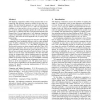564 search results - page 66 / 113 » Dependent types and program equivalence |
JFP
2010
13 years 7 months ago
2010
The aim of our work is to be able to do fully formal, machine verified proofs over Generic Haskellstyle polytypic programs. In order to achieve this goal, we embed polytypic prog...
POPL
2008
ACM
14 years 9 months ago
2008
ACM
Self-adjusting computation enables writing programs that can automatically and efficiently respond to changes to their data (e.g., inputs). The idea behind the approach is to stor...
POPL
2006
ACM
14 years 9 months ago
2006
ACM
Functional programmers often reason about programs as if they were written in a total language, expecting the results to carry over to non-total (partial) languages. We justify su...
TLCA
2009
Springer
14 years 3 months ago
2009
Springer
Abstract. Programming languages theory is full of problems that reduce to proving the consistency of a logic, such as the normalization of typed lambda-calculi, the decidability of...
LISP
2006
13 years 9 months ago
2006
We present the call-by-push-value (CBPV) calculus, which decomposes the typed call-by-value (CBV) and typed call-by-name (CBN) paradigms into fine-grain primitives. On the operatio...

